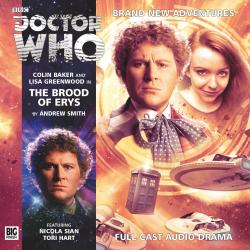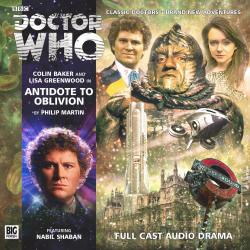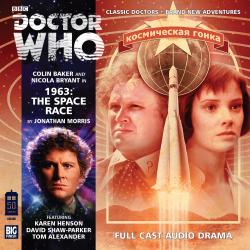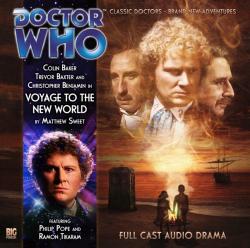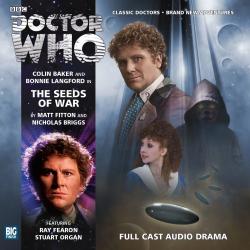The Worlds of Doctor Who
Monday, 13 October 2014 - Reviewed by
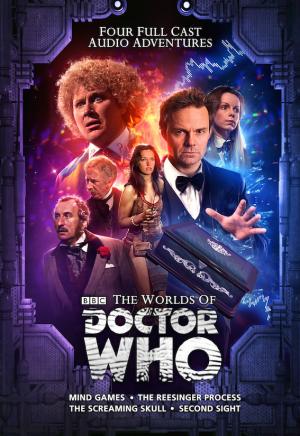
- The Worlds of Doctor Who
Written by Justin Richards, Jonathan Morris and Nick Wallace
Directed by Ken Bentley and Lisa Bowerman
Released September 2014
Henry Gordon Jago, The Worlds of Doctor Who: Mind Games
A year after Doctor Who triumphantly celebrated its golden anniversary, Big Finish (BF) is celebrating a milestone of its own – 15 years of entertaining fans with Doctor Who audio dramas. When BF first acquired the rights to producing audio Who in 1999, the TV program was on ice and its revival still another six years away. In that time, the company’s Doctor Who output now numbers hundreds of titles (well above the 190-plus releases in the so-called “main” range, if you add the Fourth and Eighth Doctor adventures, Companion Chronicles, Lost Stories and other special releases). In addition to producing numerous Doctor Who spin-offs that have explored popular and even obscure parts of the Whoniverse – eg Gallifrey, Jago & Litefoot, Counter-Measures, Dalek Empire, I, Davros, Iris Wyldthyme, Professor Bernice Summerfield and Vienna – the company has had the confidence to also secure the rights to other cult franchises and maintain a high level of quality and consistency that comes out of the deep affection, passion and dedication that the writers, producers, directors and performers have for their material.
Like its 50th anniversary counterpart The Light at the End last year, The Worlds of Doctor Who anthology is effectively Big Finish’s self-congratulatory pat on the back – as well as a gesture to the fans for their support over 15 years. Unfortunately, like The Light at the End, Worlds isn’t the most original or audacious of Doctor Who releases. Certainly there is an ambition to tell a broad story that threads its way through the rich, diverse tapestry of the Whoniverse, it’s just a great pity that the threat/villain of Worlds is so underwhelming and that the stories are for the most part so bland.
The villainous Rees, a Victorian era magician and hypnotist who subsequently defies human nature, is one-dimensional, both as a linking concept and as an antagonist. Without giving away too many spoilers, it’s tempting to say the character is a carbon copy of Dr Walter Simeon in the Doctor Who episode The Snowmen, even down to having a remote and brooding childhood and developing paranormal powers that take on a life of their own. Rees’s motives, particularly in the initial Jago & Litefoot instalment Mind Games are over-simplistic and sadistic. Indeed, because you are aware that the villain appears in all four instalments of the anthology, it practically removes all mystery and intrigue in the later stories. The Reesinger Process, the second instalment featuring the Counter-Measures Intrusion Group characters, provides some conjecture and conundrums in the course of the plot but little surprise at the climax. The title of the third serial - The Screaming Skull - is itself virtually a dead giveaway (pun intended!), although it is the most action-packed, entertaining and well written of this lot of serials. The final instalment Second Sight provides us with some insights into Rees’s back story and why he has become so powerful but aside from being a malevolent presence, the character remains grossly underdeveloped and unsophisticated. That said, Jamie Glover (who portrayed William Russell/Ian Chesterton in last year’s An Adventure in Space and Time) gives Rees charisma and authority for such a sketchy adversary.
Given Big Finish has set out to market its wares through this special release, then it will take some solace that it may lure in some curious listeners. The Jago & Litefoot and Counter-Measures instalments are virtual advertisements for those respective series, although you thankfully do not have to be an avid listener of them to enjoy Mind Games and The Reesinger Process. Justin Richards, who pens both episodes, makes them generic enough from the boxsets that you won’t be raising your eyebrows at allusions to other episodes (although no doubt if there are any, they are a payoff for avid listeners). You only need, of course, to be familiar with the characters from classic Who serials The Talons of Weng-Chiang and Remembrance of the Daleks (and even for modern series fans who won’t have seen them, those serials are readily accessible on DVD). Certainly Christopher Benjamin (Henry Gordon Jago) and Trevor Baxter (Professor George Litefoot) bring the memories flooding back with flawless portrayals of their very popular characters, and some of their dialogue, banter and comic timing is extremely well written by Justin Richards (Litefoot to Ellie Higson: “Then I shall be delighted to chaperone such a charming and refined companion!” Jago: “Oh, thank you Professor ¬─ and we’ll let Ellie come along too!”) It is just a pity that the episode in its own right is so weak.
The Counter-Measures team also scrub up well, considering that their characters in Remembrance of the Daleks were even less developed than those of Jago and Litefoot. Pamela Salem (Rachel Jensen), Simon Williams (Group Captain Gilmore) and Karen Gledhill (Alison Williams) reprise their roles effortlessly and Richards does an admirable job of fleshing out their characters and in particular their civil servant supervisor Sir Toby Kinsella (superbly played by Hugh Ross ─ “Rachel Jensen, you know I don’t do smug!”). Again, though, The Reesinger Process is little more than a framing device for this anthology and the big guest star names in Sinead Keenan (familiar to fans from appearances in modern Doctor Who and Only Human) and her real life brother Rory Keenan are wasted in their roles as sister and brother team Stephanie and James Wilton, the heads of the “mysterious” Reesinger Institute. Even The Screaming Skull is probably designed to encourage listeners to try out BF’s Doctor Who Companion Chronicles range, given that Jonathan Morris’ tale is partly a sequel to his offerings Tales from the Vault and Mastermind with American UNIT officers Ruth Matheson and Charlie Sato (the 1996 TV movie’s Daphne Ashbrook and Yee Jee Tso respectively). Having been compromised by the Master in their previous appearance, the two UNIT officers are given the opportunity to redeem themselves by returning to the Vault that stores extraterrestrial and supernatural artifacts recovered by the paramilitary organisation. Ashbrook and Tso’s enthusiasm for Doctor Who, despite their brief association with the program, is apparent not only in their performances but also in the “Behind the Scenes” CD in which they discuss their encounters with fans at Doctor Who’s 50th anniversary celebrations last year and their gratitude for being able to bring Matheson and Sato’s characters to life. Indeed, while Sato’s fanboy character in Mastermind irked this writer, his cheek in the face of danger in The Screaming Skull is memorable. Sato’s dialogue with the disembodied Rees, in which he goads the villain into revealing his plans before realising he is to go under the knife, is priceless and Tso injects plenty of humour into this exchange.
The Screaming Skull also nicely references Mind Games and The Reesinger Process and while this episode is a marked improvement on those chapters, this is down more to Morris’ strong writing, characterisation and tongue-in-cheek humour. Even then, the story is not without at least one irritant – the Terravore which stalks Matheson and Sato in the corridors of the Vault is a cross between a Dalek and the Skovox Blitzer which recently appeared on television in The Caretaker! (The Terravores debuted in the 2011 Sixth Doctor adventure The Crimes of Thomas Brewster.)
In another twist, The Screaming Skull also prominently features a reinstated Captain Mike Yates (Richard Franklin) who subsequently fills the “Brigadier” role when he recalls the Doctor (“ol’ Sixie” Colin Baker) to Earth for the final chapter Second Sight, written again by Richards in conjunction with Nick Wallace. While this tale also features Gallifrey regulars President Romana and Leela (Lalla Ward and Louise Jameson), it is more of a Sixth Doctor adventure than a Gallifrey tale and therefore unlikely to motivate casual listeners to investigate BF’s Gallifrey range. While they are as solid as you would expect, Ward and Jameson are horribly underused and Franklin is also rather superfluous to this instalment as Yates (he fares much better in The Screaming Skull). You could even argue the role of “ol’ Sixie” in this tale is symbolic – BF, after all, is largely credited with restoring the fortunes of the much maligned, lamented Sixth Doctor and the popularity of Colin Baker himself in the eyes of long-time Who fans. Certainly, the Sixth Doctor that we meet in Second Sight is Baker’s mellower, more likeable portrayal over the past 15 years and not the abrupt, impolite persona who graced our TV screens in 1984-85.
Although Second Sight explores the villain’s origins and how a character that starts as a common garden Victorian serial killer becomes a powerful menace to the wider cosmos, the final chapter is very dialogue-heavy and expository. Considering events in this serial should be drawing to a dramatic conclusion, the resolution is, if anything, dull and underwhelming. By establishing such a potent threat, Richards and Wallace set themselves up for a fall – they’re not able to devise a climax that is dramatic and nail-biting. At no point in this story do you feel that the Earth and the human race are truly under threat from the Rees malevolence. Not even the prospect that the malevolence could potentially infiltrate every aspect of our daily lives is as unsettling as it ought to be. You come away from this boxset feeling as if the story still requires closure.
Indeed, given the ambiguous ending to Second Sight and the anthology as a whole, it’s disappointing that popular archaeologist companion Bernice Summerfield was not included in the boxset to confront Rees in the 26th century, perhaps alongside Miles Richardson’s brilliant Irving Braxiatel. After all, as Lisa Bowerman points out in the CD extras, her involvement with BF stretches back to the inception of Bernice’s audio adventures ─ a year before the company obtained the Doctor Who licence. Nevertheless, Bowerman makes a dual contribution to The Worlds of Doctor Who - she is a director of the plays alongside Ken Bentley and she also plays cockney barmaid Ellie Higson, Jago and Litefoot’s impulsive, loyal friend.
As a cross-media promotion, The Worlds of Doctor Who may appeal to listeners who would like to sample the greater Doctor Who audio range and its numerous spin-offs. In turn, it’s a nice gesture for the company to be able to celebrate its output and pay back fans for their long term dedication and emotional and financial investment in its products. However, if you’re looking for something original, exciting and innovative, with substance and intrigue to boot, The Worlds of Doctor Who sadly isn’t it. You will get better examples by delving deeper into BF’s back catalogue.
